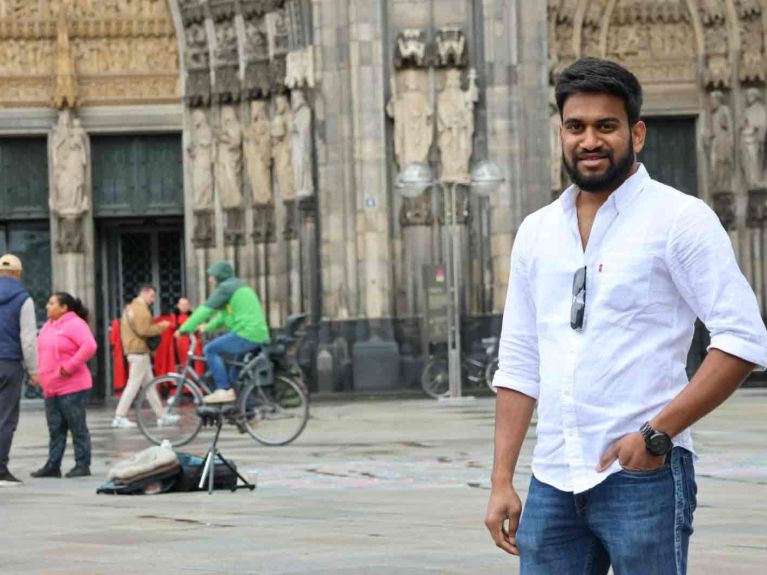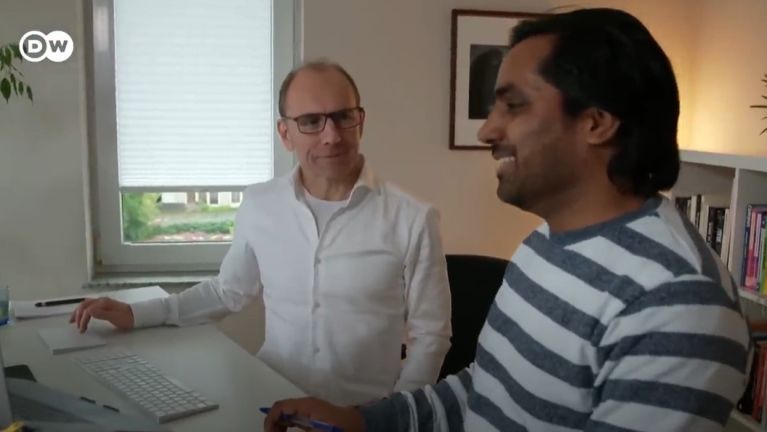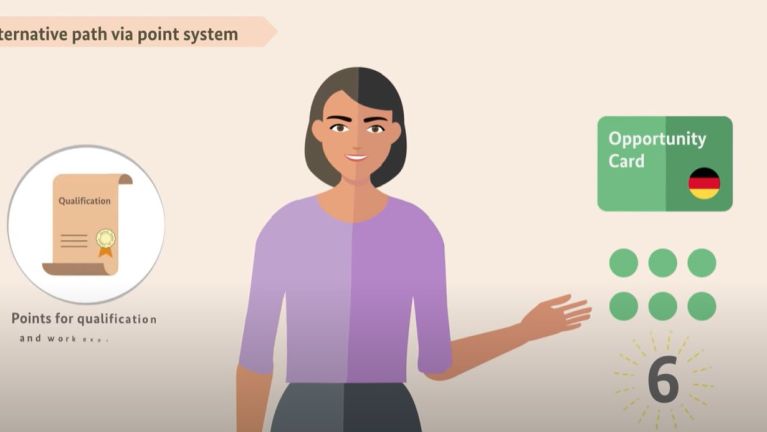“I know how much we’re in demand on the German labour market”
Three young people from India talk about how they made the move to Germany – and what they particularly like about living and working here.

Skilled workers from other countries are in demand across numerous sectors of the German economy. Three young people from India talk about how they experience day-to-day life and the world of work in Germany.
Ajay Maurya, 34, IT consultant in Kronberg near Frankfurt
“I don’t think I’ll ever forget my first day in Germany: it was early December 2021, I’d just had a long journey and arrived exhausted at Frankfurt Airport. I can still remember that the air smelled different from my home country and I was freezing cold. I come from near Delhi, where it’s usually 30 degrees – so the freezing temperatures in Germany came as a shock to me! Fortunately, I had my mentor Chinmay. He picked me up from the airport and showed me where to buy warm clothes – gloves, a quilted down coat, hats. Chinmay was the one who suggested I come to Germany in the first place. He runs an agency that finds placements for skilled Indian specialists in Germany, primarily people working in the IT sector. Before that I was working in the software industry in Delhi. It didn’t take long for me to get confirmation from the German IT company that the job was mine. They helped me with the visa process and found me an apartment – that was great.
In Germany, planning is always very thorough, so work processes are structured and productive. That’s another reason why I’d like to work for a German company on a long-term basis.
I found it easy to get used to living here: I got help from Chinmay, and there really are a lot of Indians living in Germany. Most of them work in the IT sector. I think the reason we’re so popular with German employers is that we have a high level of technical expertise and are very adaptable. I feel very much at home in Germany. What I like most is the fact that everything’s clearly regulated and structured. In Germany, planning is always very thorough, so work processes are structured and productive. That’s another reason why I’d like to work permanently for a German company, but preferably remotely from abroad, because my wife and daughter live in India and I’d like to spend more time there in the future. I’ll soon be looking for a suitable job – I don’t think it’ll be too difficult. I know how much we’re in demand on the German labour market.”
Dieses YouTube-Video kann in einem neuen Tab abgespielt werden
YouTube öffnenThird party content
We use YouTube to embed content that may collect data about your activity. Please review the details and accept the service to see this content.
Open consent formArpitha Maradesha, 31, software developer in Hamburg

“If someone had told me ten years ago that I’d be living and working in Germany one day, I’d probably have laughed out loud. I was never intending to leave India: I had my family around me and a good job in the IT sector. Then love intervened. I met my current husband in India when I was in my mid-20s, and when he moved to Hamburg for his job in 2019, I followed him. Today I’m really happy I made this decision. Not least because I’m an IT specialist, so it was very easy for me to find a job in Germany. I looked for jobs online and I only had to send out a few applications. A medium-sized IT consultancy got back to me the very same day. I’ve now been working as a software developer for the same company for five years.
Even though I’ll always miss good curry and my family, I can certainly say that Germany’s my second home!
What I like best here is the job security, especially for young mothers. When I became pregnant, I was able to take up to two years’ paid maternity leave – in India you only get a maximum of six months. My boss also assured me that I could return to my old job any time I wanted. My daughter is now almost a year old: she was born in Germany and is growing up with two cultures and two languages. We have lots of friends who are German and also Indians who have immigrated like my husband and myself. I still miss my family every day of course: my parents haven’t even met their granddaughter in person yet. Shopping at the Indian supermarket and cooking dishes from my home country helps me deal with the homesickness. Even though I’ll always miss good curry and my family, I can certainly say that Germany’s my second home!“
Manideep Allu, 25, engineering student at Otto von Guericke University in Magdeburg

”I’ve known for a long time that I wanted to do my master’s degree in Germany. I come from Andhra Pradesh in South India, where I studied engineering for my bachelor’s degree. Germany has a good reputation in my home country, especially among engineers: the universities are highly regarded and they’re not expensive. I would have had to pay more than 10,000 US dollars to do a master’s programme in the US, whereas in Germany it only costs a few hundred euros per semester. That’s why I specifically applied to German universities. I was accepted onto several master’s programmes at the same time and opted to do chemical and energy engineering in Magdeburg. I’ve been living in Germany since 2021 and I’m currently doing an internship with a large automotive supplier. It really is a lot of fun.
I like German, especially long words like “Rindfleischetikettierungsgesetz”.
I think Germany is making an effort to be attractive for students from India. A lot of master’s programmes are taught entirely in English, including mine. 80 per cent of my fellow students on my degree programme come from India. On the one hand, that’s great because it’s given me direct access to people who are in the same situation as myself. But then again it made it more difficult for me to get properly settled in Germany at first. You really need to learn the language to do that, of course. I like German, especially long words like “Rindfleischetikettierungsgesetz”. I have German friends now, too. Once you get to know them, they really come out of their shell. I like German beer as well. I definitely enjoy one at the weekend – I’m probably quite German in that respect.
I’d like to stay in Germany after I graduate, mainly because of the good work-life balance here. It’s important to me to have time for my hobbies, such as photography and travel. That’s not a problem in Germany: people keep to the set working hours here more strictly than they do in India. My plan is to gain a foothold in Germany and work as an engineer. But right now I’m busy with my master’s thesis – all I have to do is find a topic.”
Dieses YouTube-Video kann in einem neuen Tab abgespielt werden
YouTube öffnenThird party content
We use YouTube to embed content that may collect data about your activity. Please review the details and accept the service to see this content.
Open consent form
“Make it in Germany”
The main official portal for international skilled workers who want to work in Germany is “Make it in Germany”. It provides support for anyone wishing to come and work in Germany – from the preparations in their country of origin through to their arrival and first steps in Germany.




